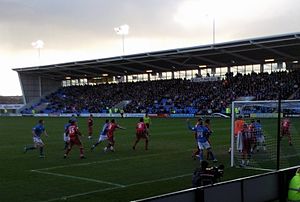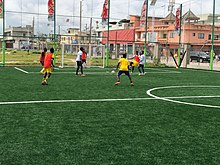Association football
- For the American sport, see American football. For other sports known as football, see Football
Association football or soccer is a sport played between two teams. In the United States, Canada and Australia, it is called soccer. In most other English-speaking countries it is called football. Association football is the most popular sport in the world.[5]





 Football pictogram | |
| Highest governing body | FIFA |
|---|---|
| Nicknames |
|
| First played | Mid-19th century England[3][4] |
| Characteristics | |
| Contact | Limited |
| Team members | 11 per side (including goalkeeper) |
| Mixed sex | No, separate competitions |
| Type | Team sport, ball sport |
| Equipment | Football (or soccer ball), shin pads |
| Venue | Football pitch (also known as football field, football ground, soccer field, soccer pitch or "pitch") |
| Glossary | Glossary of association football |
| Presence | |
| Country or region | Worldwide |
| Olympic | Men's since the 1900 Olympics and women's since the 1996 Olympics |
| Paralympic | 5-a-side since 2004 and 7-a-side from 1984 to 2016 |
Games like football have been played around the world since ancient times. The game came from England, where the Football Association wrote a standard set of rules for the game in 1824.
The game originated in China, for their army. The players had a very heavy ball and goals high. England took the idea of the Chinese game and changed the rules a bit and now it is the modern game we know today.
Each team has 11 players on the field. One of these players is the goalkeeper, the only player who is okay to touch the ball with their hands. The other ten are known as "outfield players". The players try to kick the ball into their opponents' goal. The team that scores the most goals wins. A match has 90 minutes of play, with a break of 15 minutes during the match. The break in the middle is called half-time. Added time may be added after half time or after 90 minutes to make up for time lost during the game because of fouls, free kicks, corner kicks, injuries, bookings, substitutions or any other time the game is stopped. A match can end in a tie, except in some competition games where one team must win. In that case, extra-time with two halves of 15 minutes each may be played, and if there is still a tie, a penalty shootout decides the winner. Sometimes extra-time is skipped and the game goes right into the penalty shootout.
Rules
changeFundamental rules
change- The side which scores the most goals wins. If scores are equal, the result is a draw. In cup competitions, there may be extra time and penalties to determine a winner.
- The officials in a football game are a referee and two linesmen.
- Goals are scored by getting the ball into the opponents' goal, more than halfway across the line.
- In big tournaments, referees can use cameras to check whether a goal was scored.
- The offside rule means that there must be at least two defenders between an attacker and the defenders' goal if the attacker's teammate passes the ball to him/her. Usually, one of the two defenders is the goalkeeper. (This rule is complex and has many other details.) Before this rule was added, players would often stand next to their opponents' goal and score an easy goal as soon as the ball was passed to them.
- Players may not use their hands or arms (handball), except the goalkeeper, who may use them within their own penalty area (penalty areas are in front of both goals).
- The ball is out of play if it crosses the field boundaries.
- If a player hits the ball out of play at the side of the field, the other team gets to throw the ball back into play (a throw in).
- If a player hits the ball out of play at their end of the field, the other team kicks the ball back into play from the corner (a corner kick).
- If a player kicks the ball out of play at the other end of the field, the other team kicks the ball back into play from directly in front of the goal (a goal kick).
- Football is a game of two halves. Each half is 45 minutes. The referee may add time to the end of each half when play is delayed due to injuries or substitutions. There is an interval of ten minutes between halves.
- Each team is allowed up to three substitutes from the bench during the course of a game. No player substituted can return during the game.
Behaviour rules
change- Players may not try to trip, push or hurt other players (a foul).
- Players may not hold each other or stop other players from getting to the ball (obstruction).
- When a player scores he/she is not allowed to jump into the crowd. If he/she does they will get a yellow card. The same applies to lifting or removing their shirt in celebration.
- Players must not try to hurt the referees or say hurtful things to the referee.
- Players who commit bad fouls get shown a yellow card. Players who commit really bad fouls, or get shown two yellow cards in the same game, get shown a red card. Players who get shown a red card get sent off the field and cannot finish playing the game. In some competitions (like the Premier League in England) you miss the next game (suspended) if you get a red card, or pick up 5 yellow cards during the season.
Who plays football
changeFootball is the world's most popular sport. It is played in more countries than any other game. In fact, FIFA (the Federation Internationale de Football Association) has more members than the United Nations. It was originally an all-male sport, but today it is played by both males and females (separately, except sometimes at primary school level).
In Europe, the main competitions to compete are the Champions League for the top teams from the top leagues in each country in Europe. Then there is the UEFA Europa League which is for the next best teams from each member country of the UEFA.
Most successful clubs are FC Barcelona and Real Madrid from Spain; Bayern Munich and Borussia Dortmund from Germany; Galatasaray S.K. from Turkey; Juventus, AC Milan and Inter Milan from Italy; Liverpool, Manchester United and Manchester City from England; Paris Saint-Germain from France and Al Ahly from Egypt. The most successful club in the world, in terms of domestic league results, is Rangers F.C. from Scotland, who have won more domestic league titles than any other team in the world. They have won the country's league 54 times[6] which is a world record. In May 2000, Rangers became the first team to win 100 trophies.[7][8]
Competitions
changeThere are many competitions for football, for both football clubs and countries. Football clubs usually play other teams in their own country, with a few exceptions. Here are a list of some of those exceptions:
- Welsh teams Cardiff City and Swansea City play in the EFL Championship (the 2nd tier of English league system) and the FA Cup (the English cup competition)
- Canadian teams Vancouver Whitecaps, Toronto FC, and CF Montreal play in the MLS (the USA league system)
- Monégasque team A.S. Monaco play in Ligue 1 (the French league system)
Football clubs also play other teams in their continent in competitions such as the CAF Champions League and the UEFA Champions League.
There are 6 associations (CONCACAF, CONMEBOL, CAF, UEFA, AFC, and OFC). Each association has their own continental competition between clubs and national teams. Some examples are the Copa América for CONMEBOL national teams and the Copa Libertadores for CONMEBOL clubs. FIFA organises international competitions between worldwide clubs and countries. Clubs play in the Club World Cup, and countries play for the FIFA World Cup.
The FIFA World Cup takes place every four years between national teams, and is the world's most popular sporting event, even more popular than the Olympic Games.[9] In football, there are two main competition types. In a "league", all of the teams play the same number of games, but in a "cup", teams leave the competition when they lose, until the last two teams play each other to decide the winner.
Related pages
change- List of football federations
- List of national football teams
- List of Argentine football teams
- List of Austrian football teams
- List of football teams in Armenia
- List of football teams in Azerbaijan
- List of Brazilian football teams
- List of Colombian football teams
- List of football teams in Chile
- List of Dutch football teams
- List of English football teams
- List of French football teams
- List of German football teams
- List of Indian football teams
- List of Italian football teams
- List of Japanese football teams
- List of Mexican football teams
- List of Portuguese football teams
- List of Russian football teams
- List of Scottish football teams
- List of Spanish football teams
- List of football teams in Sweden
- List of football teams in Turkey
- List of United States soccer teams
- Freestyle football
References
change- ↑ "In a globalised world, the football World Cup is a force for good". The Conversation. 10 July 2014. Archived from the original on 8 August 2014. Retrieved 11 July 2014.
- ↑ "MLS as a Sports Product—The Prominence of the World's Game in the U.S. - Working Paper - Faculty & Research - Harvard Business School". www.hbs.edu. Archived from the original on 29 January 2023. Retrieved 29 January 2023.
- ↑ "History of Football – Britain, the home of Football". FIFA. Archived from the original on 28 March 2013.
- ↑ "History of Football – The Origins". FIFA. Archived from the original on 28 October 2017. Retrieved 29 April 2013.
- ↑ "The Most Popular Sports in the World". WorldAtlas. 16 October 2020.
- ↑ "Total Number of Championships". Rec.Sport.Soccer Statistics Foundation. 4 June 2020.
- ↑ "Rangers stars celebrate". BBC Sport. 27 May 2000. Retrieved 11 June 2020.
- ↑ "Glasgow Rangers - 100 Trophies". Rec.Sport.Soccer Statistics Foundation. 21 October 2001. Retrieved 11 June 2020.
- ↑ "World's most watched TV sports events: 2006". Archived from the original on 9 July 2021. Retrieved 17 May 2007.
More reading
change- Iggulden, Hal; Iggulden, Conn (2007). "The Rules of Soccer". The Dangerous Book for Boys. New York: HarperCollins. pp. 27–29. ISBN 978-0061243585.